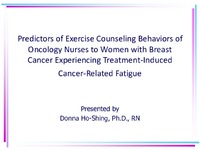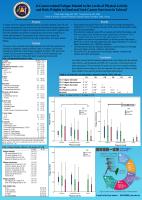| dc.contributor.author | Ho-Shing, Donna | en |
| dc.date.accessioned | 2014-11-17T13:42:57Z | |
| dc.date.available | 2014-11-17T13:42:57Z | |
| dc.date.issued | 2014-11-17 | |
| dc.identifier | INRC14C03 | |
| dc.identifier.uri | http://hdl.handle.net/10755/335051 | |
| dc.description | <p>International Nursing Research Congress, 2014 Theme: Engaging Colleagues: Improving Global Health Outcomes. Held at the Hong Kong Convention and Exhibition Centre, Wanchai, Hong Kong</p> | en |
| dc.description.abstract | <p>Session presented on Friday, July 25, 2014:</p>
<p><strong>Purpose:</strong> Fatigue is the most common long-term side effect of breast cancer treatment. Exercise is beneficial in managing the fatigue that women experience during and after treatment. Although exercise counseling is included in the National Comprehensive Cancer Network's (NCCN) guidelines for managing cancer related fatigue, many women undergoing treatment for breast cancer have never been counseled to exercise. This reveals inconsistencies between clinical care behaviors and the national treatment guidelines. There has been limited empirical research of factors that influence the exercise counseling behaviors of nurses who care for women undergoing treatment for breast cancer who are experiencing fatigue. This study explores the predictors of the exercise counseling behaviors of nurses who care for these women.</p>
<p><strong>Methods:</strong> This study uses a theoretical approach to address the factors that predict the improvement of patient outcomes. According to the Common Sense Model of Self-Regulation (1997) contextual factors (such as one's knowledge and experience) and treatment beliefs influence illness management behaviors. A descriptive correlational design was used. The sample included 126 registered nurses who are members of the Oncology Nursing Society and working in oncology settings. Data were collected from responses on the Exercise Benefits Beliefs scale (2011), the Exercise Barriers Beliefs scale (2011), and the Exercise Counseling Behaviors scale (2011) developed for this study. The Godin Leisure Time Exercise Scale (1985) was used to assess nurses' personal exercise behaviors. Demographic information and knowledge level about the NCCN guidelines for cancer treatment related fatigue were also collected. The data analysis included descriptive statistics, correlations and regression analyses.</p>
<p><strong>Results:</strong> The sample mean score for exercise counseling behaviors was 21.46 (SD = 4.71). Interestingly nurses' personal experience with exercise, r = .11, p = .278 and exercise benefits beliefs, r = .008, p = .936 did not predict their exercise counseling behaviors. A nurse's current position (role), r = -.23, p < .05, and knowledge about NCCN guidelines for cancer treatment related fatigue, r = -.25, p < 0.05, were significantly related to exercise barriers beliefs. A nurse's current position, beta = .209, p = .044, knowledge of the NCCN guidelines, beta = .535, p = .000, and Exercise barriers beliefs, beta = -.311, p = .000, predicted exercise counseling behavior.</p>
<p><strong>Conclusion:</strong> Analyses supported the relationships among contextual factors, treatment beliefs, and HCP illness management behaviors of the CSM. Nurses' beliefs about exercise barriers of women with breast cancer and CRF are more important for the extent to which they counsel these women to exercise than their beliefs in the exercise benefits for these women. Future nursing research is needed to explore the influence of nurses' roles and to target negative exercise beliefs in interventions designed to improve nurses' exercise counseling behaviors for women with breast cancer and CRF, thus effecting positive outcomes for these women.</p> | en |
| dc.format | Text-based Document | en |
| dc.language.iso | en | en |
| dc.subject | Exercise Beliefs | en |
| dc.subject | Cancer-Related Fatigue | en |
| dc.subject | Exercise Counseling | en |
| dc.title | Predictors of exercise counseling behaviors of oncology nurses to women with breast cancer experiencing treatment-induced cancer-related fatigue | en |
| dc.title.alternative | Health promotion and disease prevention in the patient with cancer | en |
| dc.type | Presentation | en |
| dc.rights.holder | <p>
All rights reserved by the author(s) and/or publisher(s) listed in this item record unless relinquished in whole or part by a rights notation or a Creative Commons License present in this item record.
</p><p>
All permission requests should be directed accordingly and not to the Sigma Repository.
</p><p>
All submitting authors or publishers have affirmed that when using material in their work where they do not own copyright, they have obtained permission of the copyright holder prior to submission and the rights holder has been acknowledged as necessary.
</p> | en |
| dc.description.note | <p>Items submitted to a conference/event were evaluated/peer-reviewed at the time of abstract submission to the event. No other peer-review was provided prior to submission to the Henderson Repository.</p> | |
| dc.type.category | Full-text | en |
| dc.evidence.level | N/A | en |
| dc.research.approach | N/A | en |
| dc.contributor.department | Gamma Nu | en |
| dc.author.details | Donna Ho-Shing, PhD, RN | en |
| dc.conference.name | 25th International Nursing Research Congress | en |
| dc.conference.host | Sigma Theta Tau International | en |
| dc.conference.location | Hong Kong | en |
| dc.date.conferenceyear | 2014 | |
| dc.description.reviewtype | Abstract Review Only: Reviewed by Event Host | en |
| dc.description.acquisition | Proxy-submission | en |





